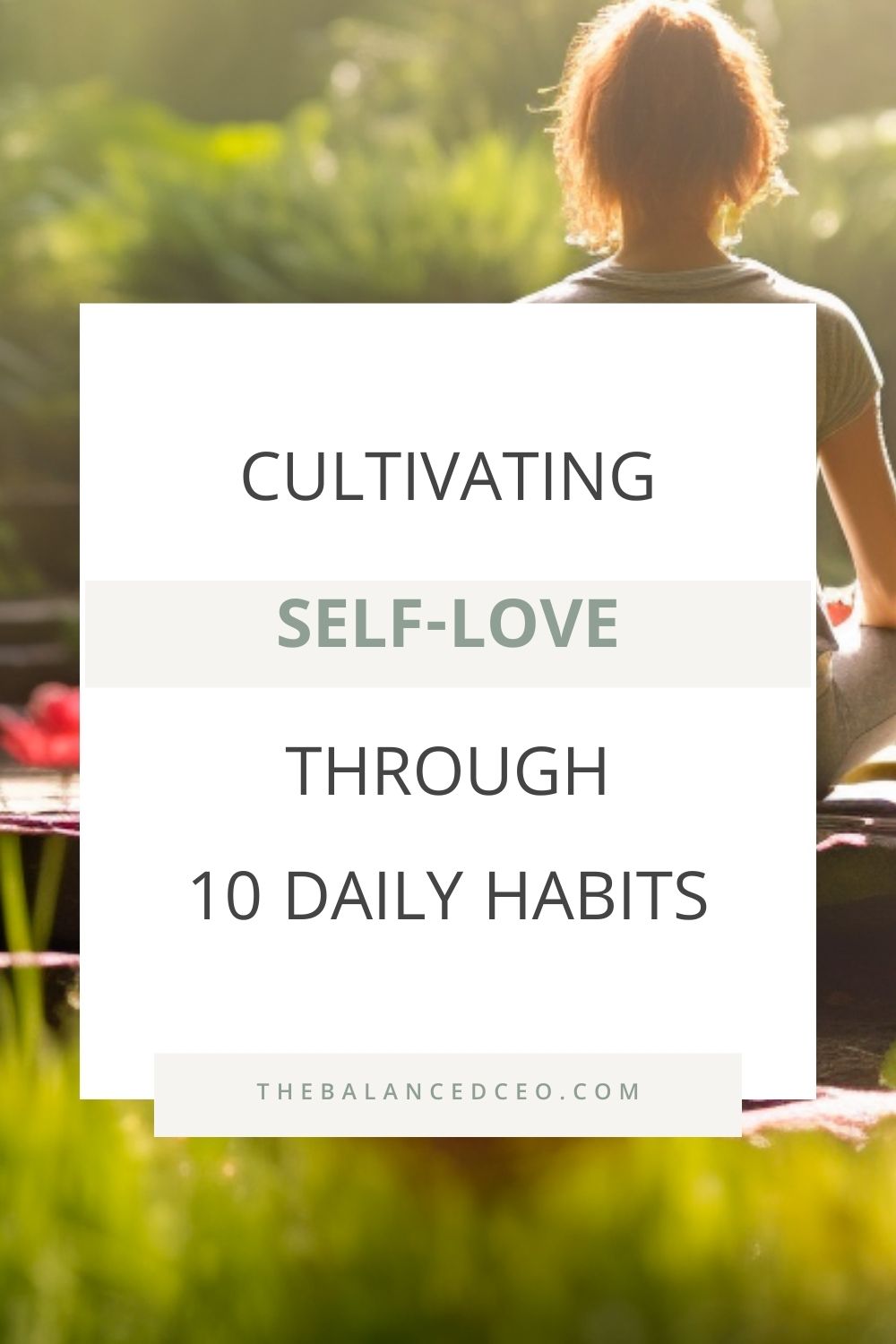This post may contain affiliate links, which means I’ll receive a commission if you purchase through my links, at no extra cost to you. Please read full disclosure for more information.

Self-love is an inner love and acceptance of who we are and how we are. Oscar Wilde beautifully encapsulated this concept with the quote, “To love oneself is the beginning of a life-long romance.” However, understanding and practicing self-love is often more challenging than it seems. It’s not about narcissism or selfishness; rather, it’s about acknowledging and embracing our own worth and value. This week, we explore the journey from recognizing the lack of self-love to nurturing it until it becomes a natural part of our daily lives. In the pursuit of holistic well-being, self-love extends to every aspect of our lives, including our health. Just as the journey to self-love unfolds, finding the best dentist in Vienna VA becomes a crucial step in caring for ourselves, ensuring that our oral health aligns with the overall love and attention we give to our well-being.
Understanding Self-Love
Self-love, in its essence, is a state of appreciation for oneself that grows from actions supporting our physical, psychological, and spiritual growth. It’s about recognizing our worth as individuals and nurturing our well-being, both mentally and physically. Self-love means caring for ourselves with the same kindness and understanding we offer to others. It is acknowledging our strengths and weaknesses and still accepting ourselves wholeheartedly.
However, it’s important to distinguish self-love from selfishness. While selfishness is a self-centered approach at the expense of others, self-love is about giving ourselves the necessary care and respect that enables us to be more present and generous with those around us. Self-love is a balanced approach where we don’t diminish others but rather, grow in our ability to contribute positively to our relationships and environment.
#1 – Start with Self-Acceptance
A fundamental aspect of cultivating self-love is practicing self-acceptance. This involves embracing all parts of yourself – your strengths, weaknesses, successes, and failures. It’s about acknowledging your imperfections as part of your unique human experience and not as flaws that diminish your value. Daily self-acceptance can be fostered through affirmations that reinforce positive self-perception, journaling to process and accept your thoughts and feelings, and consciously challenging and replacing critical thoughts with compassionate ones.
Another way to practice self-acceptance is to celebrate your small victories and acknowledge your efforts, regardless of the outcome. Remember, self-acceptance is a journey, not a destination. It requires patience and perseverance but is essential for building a strong foundation of self-love.
#2 – Prioritize Personal Time
In the hustle of daily life, taking time out for oneself can often take a backseat. However, carving out ‘me time’ is crucial for self-love. It’s during these moments that you can reconnect with yourself, reflect on your needs, and engage in activities that bring you joy and relaxation.
This personal time could be anything that makes you feel rejuvenated – reading a book, taking a long bath, meditating, practicing a hobby, or simply sitting quietly. The key is to consciously make this time a non-negotiable part of your day or week. By prioritizing personal time, you send a powerful message to yourself and others about your worth and the importance of your well-being. It also sets a healthy boundary, reinforcing the idea that your needs and desires are valid and important.
#3 – Set Realistic Goals and Expectations
Setting realistic goals and managing expectations is a vital part of practicing self-love. It’s about understanding and accepting your limits and not setting yourself up for failure with unattainable goals. This approach reduces the pressure and stress that often accompany unrealistic expectations.
Start by setting small, achievable goals that lead to larger ones. Celebrate each accomplishment, no matter how minor it may seem. This practice builds confidence and reinforces a positive self-image. Additionally, be mindful of the expectations you place on yourself. Are they your own, or are they influenced by societal standards or the opinions of others? Aligning your goals and expectations with your true values and capabilities is a fundamental step in practicing self-love.
#4 – Practice Positive Affirmations
Self-love is a dialogue with oneself, a nurturing conversation that affirms one’s worth and cultivates inner peace. It’s in the gentle reminders of our strengths and the quiet celebration of our progress that we find the essence of self-appreciation. Positive affirmations are the language of self-love, powerful statements that can rewire our brains towards positivity and well-being. By regularly practicing gratitude and affirming our positive qualities, we lay down the neural pathways that uplift and empower us.
Innertune is your partner in this transformative journey. It’s an app designed to harmonize the practice of self-affirmations with the rhythm of your daily life.
#5 – Practice Saying No
The ability to say no is a powerful tool in the self-love arsenal. It’s about setting boundaries and honoring your needs and limits. Saying no can be challenging, especially if you’re used to pleasing others, but it is essential for maintaining your mental health and well-being.
To start, recognize situations where you overcommit or agree to things that don’t align with your values or priorities. Practice saying no in low-stakes situations to build your confidence. Remember, saying no does not make you a bad person; it makes you a self-aware individual who respects their own time and energy. It’s a skill that gets easier with practice and can significantly improve your quality of life.
#6 – Embrace Kindness Towards Yourself
Cultivating kindness towards oneself is a cornerstone of self-love. It involves treating yourself with the same compassion and understanding that you would offer to a friend. Begin by noticing how you speak to yourself, especially during challenging times. Replace harsh self-criticism with words of encouragement and understanding.
Implementing self-care practices is another way to demonstrate kindness to yourself. This can include anything from ensuring adequate rest and nutrition to engaging in activities that nurture your soul, like spending time in nature or pursuing creative interests. Remember, being kind to yourself isn’t a luxury; it’s a necessity for a healthy, balanced life.
#7 – Manage Your Inner Critic
Your inner critic can be one of the biggest obstacles to self-love. Learning to manage this internal voice is crucial. Start by becoming aware of negative self-talk. When you catch yourself engaging in self-criticism, pause and ask whether you would speak to someone else in the same way. Often, the answer is no, which is a clear sign to adjust your inner dialogue.
Transform your inner critic into a supportive ally by challenging its negative statements. For instance, if your inner critic says you’re not good enough, counter with specific examples of your capabilities and achievements. Over time, this practice can turn your inner critic into a source of encouragement rather than discouragement.
#8 – Engage in Mindfulness and Meditation
Mindfulness and meditation are powerful tools for fostering self-love. These practices help you stay present and connected to yourself, reducing the impact of negative thoughts and emotions. Start with just a few minutes of meditation each day, focusing on your breath and the sensations in your body.
Mindfulness can be practiced throughout the day by paying full attention to whatever you’re doing, whether it’s eating, walking, or simply breathing. This awareness brings a sense of peace and centeredness, making it easier to cultivate a loving relationship with yourself.
#9 – Discover and Pursue What Energizes You
Finding and engaging in activities that energize and excite you is an essential aspect of self-love. This process involves exploring your passions and interests and making time for them in your life. Whether it’s a creative hobby, a physical activity, or learning something new, doing what makes you feel alive is crucial for your mental and emotional well-being.
Start by identifying activities that bring you joy or curiosity. Then, make a commitment to incorporate them into your routine, even if it’s just for a few minutes each day. Pursuing your passions not only nurtures your spirit but also reinforces the importance of your happiness and fulfillment.
# 10 – Commit to Personal Growth
Personal growth is a continuous journey that plays a significant role in self-love. It involves seeking opportunities for learning, development, and self-improvement. This could be through reading, taking courses, seeking feedback, or challenging yourself with new experiences.
Committing to personal growth means being open to change and self-reflection. It’s about acknowledging your areas of improvement and taking steps to evolve in those areas. By investing in your growth, you affirm your self-worth and demonstrate a commitment to becoming the best version of yourself.
Conclusion
Incorporating these daily habits into your life can profoundly nurture your self-love. Each habit, whether it’s practicing self-acceptance, managing your inner critic, or engaging in activities that energize you, plays a vital role in developing a healthier relationship with yourself. Self-love isn’t just about feeling good; it’s about creating a sustainable and nurturing inner environment where you can thrive.
Remember, the journey to self-love is personal and ongoing. It requires patience, commitment, and, most importantly, a willingness to prioritize your well-being. As you embrace these habits, you’ll likely notice a positive shift in your outlook, relationships, and overall happiness.





Leave a Reply